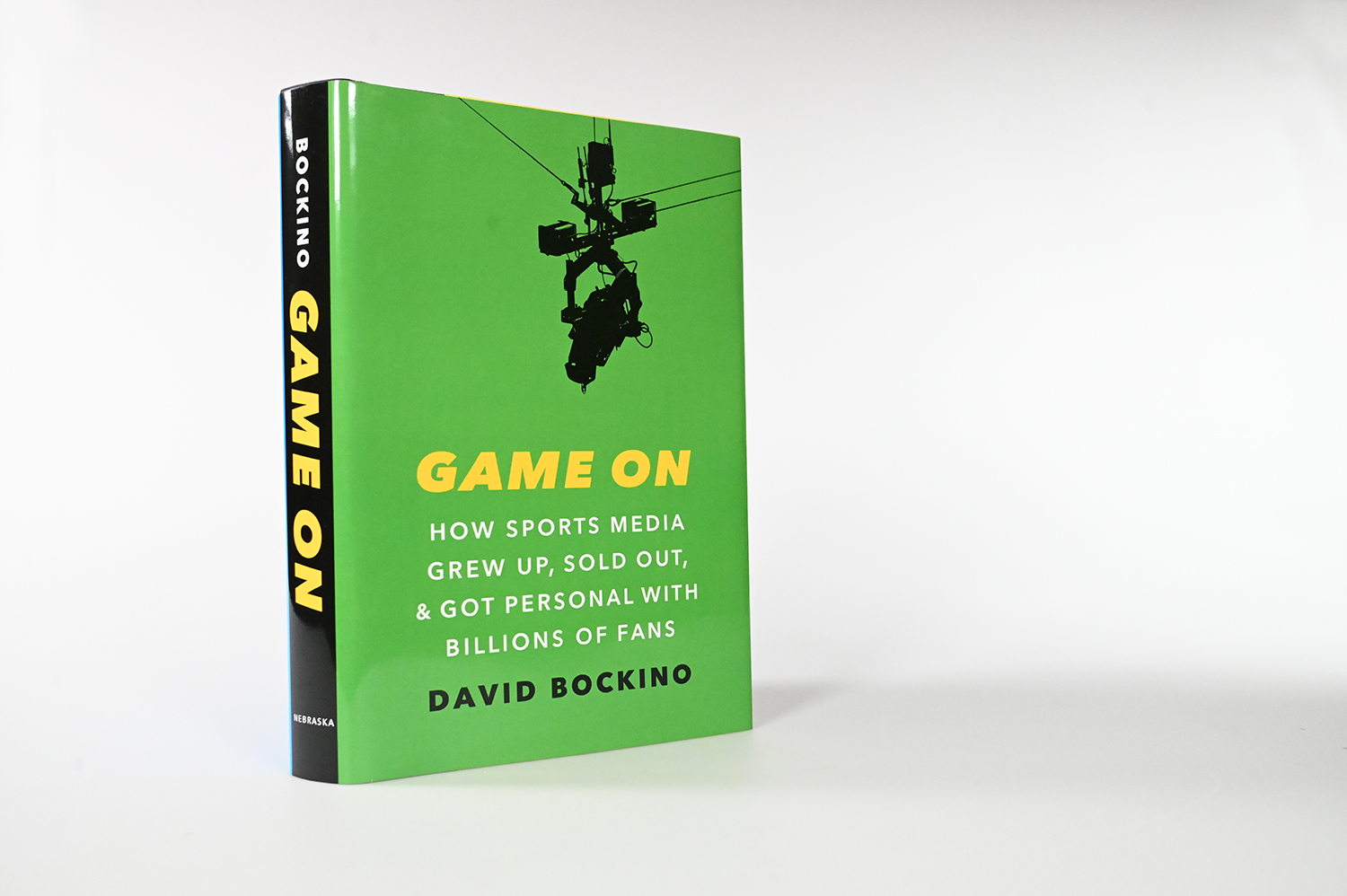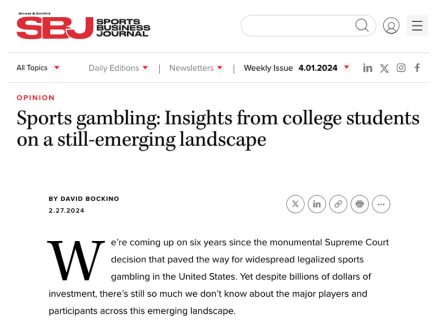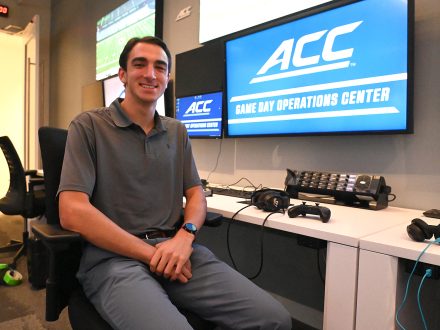Titled “Game On: How Sports Media Grew Up, Sold Out, and Got Personal with Billions of Fans,” Bockino’s book – published on April 1 – is the first comprehensive, general audience history of the sports media industry.

Sports are a results-based industry measured in wins, losses and statistics.
So, it only makes sense to evaluate the first year of the Sports Media Lab at Elon University in a similar fashion – and the metrics look good.

Since the lab’s launch in September, the inaugural student cohort – led by Associate Professor of Sport Management David Bockino – has embraced opportunities and avenues to pursue sports media-related research questions. The five Elon students and their faculty mentor have examined topics such as sports gambling, fantasy sports, player/team content creation, broadcast innovations and the perceived value of streaming services.
Supported by an Elon Innovation Council grant, the lab has provided a structure for students, faculty and sport industry partners to workshop new ideas about relevant research and find ways to make them a reality. The lab’s objective is simple: to make Elon an industry leader in sports media research.
“It has been an exciting first year for our Sports Media Lab, providing our students with a cohort-based undergraduate research experience that supports their curiosity in sports media,” Bockino said. “And we feel fortunate to find partners who have been eager to collaborate with us and expand our research.”
The lab has had an active first year examining the sports media habits of college students, including multiple focus group sessions in November and March. The first set of focus groups covered sports gambling and player/team content creation, while the second group explored the perception and value of sports streaming services and content piracy.

Based on focus groups discussions, as well as interviews and surveys, the lab published in February a Sports Business Journal op-ed, titled “Sports gambling: Insights from college students on a still-emerging landscape.” The lab also garnered media attention in the days following North Carolina’s March launch of statewide sports wagering. Bockino was featured in several media interviews, including an extended appearance on CBS affiliate WFMY in Greensboro.
In addition to their cohort experience, all five student participants in the Sports Media Lab tackled individual research topics. Subjects varied from how European soccer clubs market their team to American audiences to the cohesive aspect of sports viewership on college campuses among international students to the way different groups perceive the value of NFL players.
Elliot Rezek ’24, a media analytics and computer science double major, spent this year using eye-tracking software to study viewers’ affinity for new camera angles in NFL broadcasts. He has worked closely with Professor of Strategic Communications Qian Xu to delve into the subject, trying to identify if viewer camera angle preferences are based on how familiar viewers are with the sport.
“I was initially drawn to the lab because it was a combination of my two main interests: academic research and sports,” he said. “As someone who isn’t a sport management major, it was a great way to study sports in ways I don’t often get to in my other classes.”
Rezek credits Xu and Bockino for helping him tighten his project’s parameters, while pushing him to expand his skillset and look for experiences for personal growth. This includes his upcoming oral presentation in April at the National Conference on Undergraduate Research (NCUR) in Long Beach, California.
“Well, I won’t lie. I’m pretty scared to present at NCUR,” Rezek quipped. “I’ve never done anything like this before. I am excited however because I’ve worked hard to get my research to where it is now. I want to present what I have learned through my results and process. Dr. Bockino has encouraged me to present at NCUR because he knew it would push me outside of my comfort zone, and that’s what makes him a good mentor.”

Anthony Bamford ’25, a media analytics major, echoed Rezek’s sentiments, noting the benefits of working in collaboration with Bockino. Together, the student and mentor have partnered with the Atlantic Coast Conference to explore the variables behind college football game lengths. Bamford was recently accepted into Elon’s SURE program to continue with this research and to eventually present his findings to the ACC.
“Dr. Bockino is very good at asking questions that challenge me to think critically about not just the topic at hand, but how outside factors may influence my research,” said Bamford, who completed an internship with the ACC last fall. “His mentorship has been important over the past year in helping me narrow my project scope.”
The Sports Media Lab’s latest news drop is the April 1 publication of Bockino’s new book, “Game On: How Sports Media Grew Up, Sold Out, and Got Personal with Billions of Fans.”
Published by the University of Nebraska Press, the book is the first comprehensive look at the evolution of the sports media industry and suggests that the increased personalization of content (i.e. social media, fantasy sports, gambling) is in stark contrast to the industry’s initial focus on the collective experience. The text delves into what the introduction of widespread legalized gambling – a key component to this evolution – could mean for fans, for sports teams and leagues, and for society overall.
According to Bockino, the idea for his new publication traces back to his Through the Lens of ESPN course, a Winter Term offering that explores the intersection of sports, media and culture. His past courses have traveled to Argentina, Brazil, Spain and Uruguay.
“It was during this class that I found myself wishing I had a comprehensive overview of the history of sports media. So, I wrote one.”
– David Bockino
Bockino’s text provides necessary historical context, pointing out that thanks to radio and broadcast television coverage sports was largely a shared experience enjoyed with others – at the same time. But since the 1979 launch of ESPN, which Bockino called the “turning point” of sports media consumption, there has been greater and greater fragmentation among sports fans.
“From talk radio to fantasy sports, video games, and now widespread sports gambling, fans have more and more control of what they watch, who they watch, and who they root for,” Bockino said. “The book addresses this idea of the personalization of the sport fan experience, and whether or not it’s good for society as we fall further into a self-centered media experience overall.”
While the academic year nears its conclusion, Bockino and the Sports Media Lab have already turned their attention to the upcoming year. The lab has already secured a partnership with Charlotte FC where students will pursue research projects developed in collaboration with the Major League Soccer team. It is a collaboration is Bockino is excited for – and something he envisioned when he initially launched the lab.
“An integral component to the Sports Media Lab is its mutually beneficial relationship with sport industry partners,” Bockino said. “We really look forward to kicking off our partnership with Charlotte FC this coming fall – a relationship we expect to be beneficial both to them and to us. And we continue to seek out additional partners who are interested in studying emerging trends within the sports media environment.”


